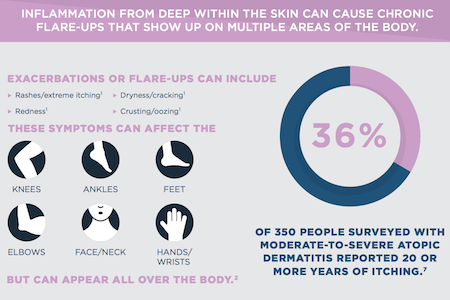Article
More Than Skin Deep: 'Understand AD' Raises Awareness about Atopic Dermatitis
Author(s):
Award-winning chef Elizabeth Falkner and board-certified dermatologist Doris Day spoke with MD Magazine about their collaborative efforts on a new atopic dermatitis campaign, ‘Understand AD.’
Editor’s note: Award-winning chef Elizabeth Falkner and board-certified dermatologist Doris Day spoke with MD Magazine about their collaborative efforts on a new atopic dermatitis campaign, ‘Understand AD.’ Falkner has battled this disease for more than two decades, and hopes to inspire others to start the dialogue about this physically and emotionally debilitating skin condition. Dr. Day shares her clinical expertise, since she regularly consults with patients afflicted with atopic dermatitis.

Pictured Left: Chef Elizabeth Falkner, Right: Doris Day, MD
MD Magazine: After living with the challenges of atopic dermatitis for more than 20 years, what made you decide now to collaborate with the ‘Understand AD’ campaign?
EF: I was diagnosed with moderate-to severe atopic dermatitis about 20 years ago. I initially had rashes on my lower legs followed by scaly, painful, itchy rashes on my hand — that’s probably the most dramatic and painful part of it for me. I didn’t like it on my legs, but on my hands it’s really hard as a chef, considering you’re always washing your hands and working in a harsh environment. I tried using a lot of prescription medicine from my dermatologist back then, along with different lotions, OTC, and homeopathic remedies, but it’s hard to keep it on your hands – it tends to be a temporary fix.
But, to be honest, this campaign, Understand AD, is really appropriate for me at this time. I’m not working fulltime at restaurants anymore, and I think my brain is still back 20 years ago with the first diagnosis for me — having doctors say there is no cure, and “good luck, you should stop cooking.”
No, I didn’t want to stop cooking, but here I am much later in time not working fulltime in restaurants. I don’t have as dramatic of breakouts at this point, as I was having at initial diagnosis. I think the campaign is great, because I’m hearing and learning how medicine is evolving and understanding more about this disease. I’m genuinely excited to spread that awareness to people who have suffered physically and emotionally. I’m just hoping that other people who suffer from this can have the dialogue with their dermatologists and learn much more about it and hopefully find a cure.
MD Magazine: How did atopic dermatitis affect you both in and out of the kitchen? Did the intense kitchen heat irritate or affect your topical medications?
EF: My doctor told me to stop cooking when I was 30, but that was a completely inappropriate time for me as I was at the height of my career. So, over the years I’ve tried to figure out ways to have my hands literally off the food and participate more in other areas of the restaurant. I did use latex gloves when cooking, but trapping hands in latex gloves for hours wasn’t great for the disease. Yes, working all day with the itchy, painful, disgusting looking lesions was difficult, and I had subconsciously found ways to almost hide them. I have a strong personality though, so for me it was mostly mind over matter. And I don’t really care what people think my behavior is, because I’m really just trying to get cool things done.
I hope that’s an inspiring message for people, because I haven’t let it get in the way of things I like to do. It can be an alienating disease, but people aren’t alone.

MD Magazine: Throughout your career, have you worked with or known others who also had this skin condition?
EF: No, I haven’t really met other associates or friends with whom I’ve had discussion about it. However, my little brother has atopic dermatitis as well as my maternal grandfather. But when I mentioned to my mother I was diagnosed with it, she just brushed it off, “oh, your grandfather had something like that.” I love learning that this is happening more on the inside than on the outside, and I don’t think this is something my family has wrapped their heads around. And I recently heard from one of my cousins on this campaign who thinks my grandmother on my dad’s side had it, but was probably never diagnosed with it.
MD Magazine: What are your personal goals working with ‘Understand AD’? Is there anything on the horizon?
EF: I really just wanted to help bring awareness to this disease. I’ve been wrestling with it for 20 years, so I think it’s great that we’re bringing this up and talking to medical professionals. I don’t want to have it anymore, and I had been very pessimistic about the idea of resolving it, because I’ve had to deal with it for so long. I feel like I’ve tried so many remedies
MD Magazine: Have there been changes or differences in your lifestyle you have found beneficial?
EF: Yes. Not working fulltime in restaurants has decreased my stress level. I exercise a lot: training for the NY marathon, do yoga, Korean sword fighting, and think about what I eat. It helps me on many levels, but also helps keep the disease at bay.
MD Magazine: As a long-time dermatologist, how have you seen atopic dermatitis treatment evolve?
Dr. Day: So this is an area of very active research, and my interest in it is I see patients who suffer with it every single day. They’re amongst the most uncomfortable people you could meet. My goal is to make them more comfortable, help them gain control, and help them understand they’re not alone. My hope is that we’ll have some exciting new treatments in the near future.
MD Magazine: What treatment methods do you currently use?
Dr. Day: I use a combination of very straightforward prescription medications along with many OTC medications. There are a lot of prescriptions, because it’s really ‘one size fits none.’ So, I need to find the right recommendations depending on their age, level of involvement, what they’ve used before, what’s helping, and what’s not helping. I have to try to find the right balance for them and monitor it to see if it’s still helping. If it’s not, I’ve got to rotate it to the next one. So, unfortunately, there isn’t one medication that helps everyone, so I have to keep on coming up with combinations that will help as many as possible for as long as possible.
MD Magazine: Dermatologic conditions are more than just skin deep. How do you advise your patients on a psychological level?
Dr. Day: I have conversations with them. Addressing it, and mentioning what other people go through helps them understand this is not their fault. This is a problem of their immune system responding inappropriately, so we need to get that under control.
MD Magazine: While a member of several dermatology organizations, what is your role with ‘Understand AD’?
Dr. Day: I’m aiming to raise awareness both with patients and my peers. Explaining to them how conversation is important, and this is an area of active research we all need to stay on top of.



